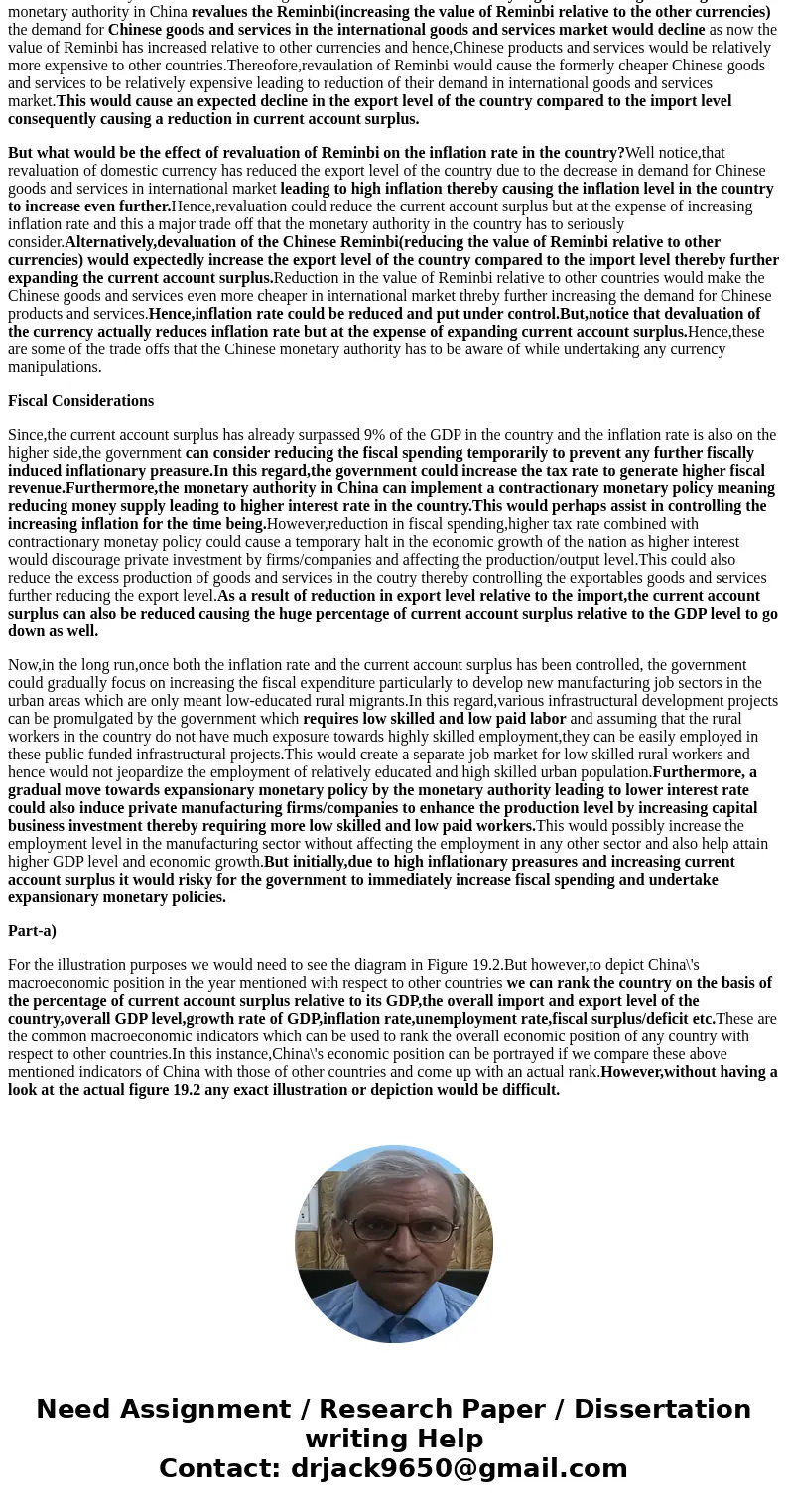UISstaint ver time 9 You are an economic adviser to the gove
Solution
Part-b)
As mentioned in the question,China had a current account surpplus during 2008 implying that the value of exports of goods and services exceeded the value of imports of goods and services for that particular year.At the same time the economy is confronted by growing inflationary preasures.Hence,in this instance the economic policy makers have to be cautious so that any policy action does not have any undesirable impact on the expanding inflationary trend.
It can be reasonably assumed based on the given information that under heavily regulated exchange rate regime if the monetary authority in China revalues the Reminbi(increasing the value of Reminbi relative to the other currencies) the demand for Chinese goods and services in the international goods and services market would decline as now the value of Reminbi has increased relative to other currencies and hence,Chinese products and services would be relatively more expensive to other countries.Thereofore,revaulation of Reminbi would cause the formerly cheaper Chinese goods and services to be relatively expensive leading to reduction of their demand in international goods and services market.This would cause an expected decline in the export level of the country compared to the import level consequently causing a reduction in current account surplus.
But what would be the effect of revaluation of Reminbi on the inflation rate in the country?Well notice,that revaluation of domestic currency has reduced the export level of the country due to the decrease in demand for Chinese goods and services in international market leading to high inflation thereby causing the inflation level in the country to increase even further.Hence,revaluation could reduce the current account surplus but at the expense of increasing inflation rate and this a major trade off that the monetary authority in the country has to seriously consider.Alternatively,devaluation of the Chinese Reminbi(reducing the value of Reminbi relative to other currencies) would expectedly increase the export level of the country compared to the import level thereby further expanding the current account surplus.Reduction in the value of Reminbi relative to other countries would make the Chinese goods and services even more cheaper in international market threby further increasing the demand for Chinese products and services.Hence,inflation rate could be reduced and put under control.But,notice that devaluation of the currency actually reduces inflation rate but at the expense of expanding current account surplus.Hence,these are some of the trade offs that the Chinese monetary authority has to be aware of while undertaking any currency manipulations.
Fiscal Considerations
Since,the current account surplus has already surpassed 9% of the GDP in the country and the inflation rate is also on the higher side,the government can consider reducing the fiscal spending temporarily to prevent any further fiscally induced inflationary preasure.In this regard,the government could increase the tax rate to generate higher fiscal revenue.Furthermore,the monetary authority in China can implement a contractionary monetary policy meaning reducing money supply leading to higher interest rate in the country.This would perhaps assist in controlling the increasing inflation for the time being.However,reduction in fiscal spending,higher tax rate combined with contractionary monetay policy could cause a temporary halt in the economic growth of the nation as higher interest would discourage private investment by firms/companies and affecting the production/output level.This could also reduce the excess production of goods and services in the coutry thereby controlling the exportables goods and services further reducing the export level.As a result of reduction in export level relative to the import,the current account surplus can also be reduced causing the huge percentage of current account surplus relative to the GDP level to go down as well.
Now,in the long run,once both the inflation rate and the current account surplus has been controlled, the government could gradually focus on increasing the fiscal expenditure particularly to develop new manufacturing job sectors in the urban areas which are only meant low-educated rural migrants.In this regard,various infrastructural development projects can be promulgated by the government which requires low skilled and low paid labor and assuming that the rural workers in the country do not have much exposure towards highly skilled employment,they can be easily employed in these public funded infrastructural projects.This would create a separate job market for low skilled rural workers and hence would not jeopardize the employment of relatively educated and high skilled urban population.Furthermore, a gradual move towards expansionary monetary policy by the monetary authority leading to lower interest rate could also induce private manufacturing firms/companies to enhance the production level by increasing capital business investment thereby requiring more low skilled and low paid workers.This would possibly increase the employment level in the manufacturing sector without affecting the employment in any other sector and also help attain higher GDP level and economic growth.But initially,due to high inflationary preasures and increasing current account surplus it would risky for the government to immediately increase fiscal spending and undertake expansionary monetary policies.
Part-a)
For the illustration purposes we would need to see the diagram in Figure 19.2.But however,to depict China\'s macroeconomic position in the year mentioned with respect to other countries we can rank the country on the basis of the percentage of current account surplus relative to its GDP,the overall import and export level of the country,overall GDP level,growth rate of GDP,inflation rate,unemployment rate,fiscal surplus/deficit etc.These are the common macroeconomic indicators which can be used to rank the overall economic position of any country with respect to other countries.In this instance,China\'s economic position can be portrayed if we compare these above mentioned indicators of China with those of other countries and come up with an actual rank.However,without having a look at the actual figure 19.2 any exact illustration or depiction would be difficult.


 Homework Sourse
Homework Sourse